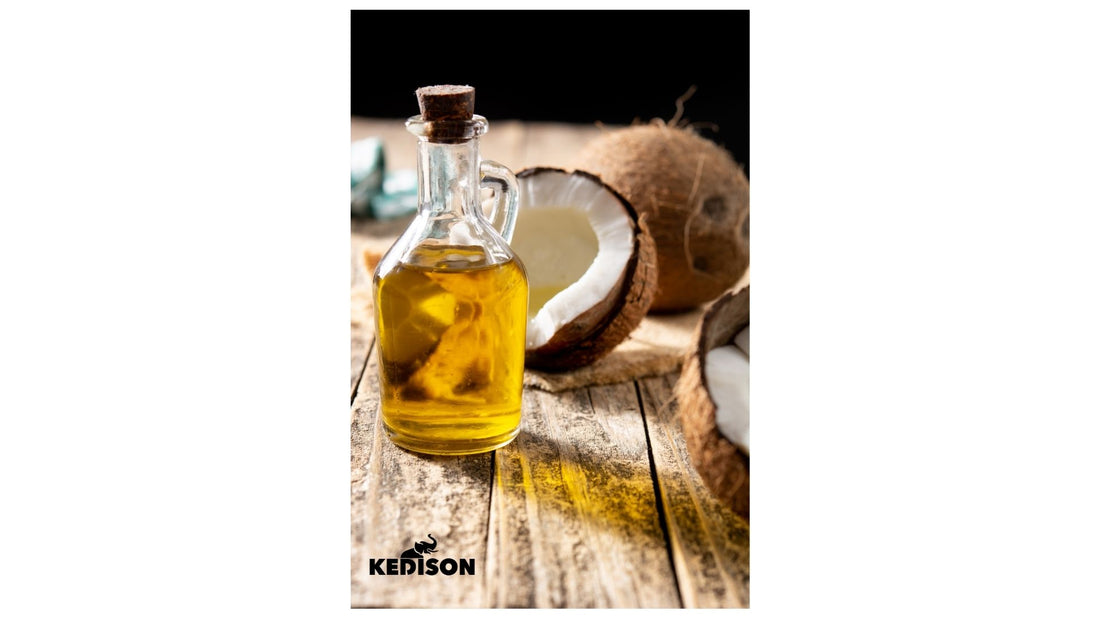
Palm Oil vs. Coconut Oil: Why Coconut Oil is the Superior Choice for Health and Sustainability
Share
When comparing palm oil and coconut oil, the difference lies in their nutritional benefits, health implications, and environmental impact. While both oils are used in cooking and cosmetics, coconut oil emerges as the superior option for those seeking a healthier, more sustainable alternative.
Source and Production
- Palm Oil: Derived from the fruit of the oil palm tree (Elaeis guineensis), palm oil is mass-produced, especially in Southeast Asia. The demand for palm oil has led to large-scale deforestation, negatively impacting ecosystems and biodiversity. Learn more about palm oil's environmental impact.
- Coconut Oil: Sourced from mature coconuts harvested from coconut palms (Cocos nucifera), coconut oil is extracted through methods like cold pressing or expeller pressing. These processes are less invasive to the environment, and coconut farming has a smaller ecological footprint. Discover how coconut oil is sustainably produced.
Specification Differences
|
Specification |
Palm Oil |
Coconut Oil |
|
Source |
Fruit pulp and kernel of oil palm |
Coconut meat (fresh or dried) |
|
Fat Composition |
50% saturated, 40% monounsaturated, 10% polyunsaturated |
90% saturated fat (mainly lauric acid) |
|
Appearance |
Orange-red (unrefined), yellow or clear (refined) |
Solid at room temperature, white in solid form, clear when melted |
|
Melting Point |
Around 35°C (95°F) |
Around 24°C (76°F) |
|
Extraction Methods |
Mechanically pressed or solvent extraction |
Cold pressed, expeller pressed |
|
Smoke Point |
230°C (446°F) (refined) |
177°C (350°F) (virgin coconut oil) |
|
Shelf Life |
Long-lasting, can last up to 12 months |
Stable, up to 2 years in a cool environment |
|
Nutritional Profile |
Rich in vitamins A and E (tocotrienols, carotenoids) |
Rich in medium-chain triglycerides (MCTs), particularly lauric acid |
Why Coconut Oil is the Better Choice
- Healthier Fat Composition
- Coconut Oil: Coconut oil is rich in medium-chain triglycerides (MCTs), particularly lauric acid, which offer unique health benefits. MCTs are quickly metabolized into energy, making coconut oil a great option for boosting metabolism, supporting weight loss, and providing a quick energy source. Learn more about MCTs and their health benefits. Read about the benefits of coconut oil for heart health
- Palm Oil: While palm oil does contain beneficial fats, it also has a high amount of saturated fats. The refined varieties often used in processed foods may raise LDL (bad) cholesterol, posing a higher risk for heart disease. In contrast, coconut oil is associated with an increase in HDL (good) cholesterol, promoting better heart health when consumed in moderation.
- Superior for Skin and Hair Care
- Coconut Oil: The benefits of coconut oil for hair and skincare are widely recognized. Its rich lauric acid content deeply nourishes hair, strengthens it from within, and helps combat dryness. For the skin, coconut oil acts as a natural moisturizer, reduces inflammation, and protects against environmental damage. This makes it a go-to for those seeking a natural beauty solution. Learn how to use coconut oil in your beauty routine.
- Palm Oil: While palm oil is used in many commercial soaps and lotions, its effects are not as potent as coconut oil’s, especially when it comes to moisturizing and protecting the skin and hair. [Find out how coconut oil compares to other oils for hair care](external link to comparative hair care article).
- Minimal Environmental Impact
- Coconut Oil: Coconut farming has a much smaller environmental impact compared to palm oil. Coconut trees grow in harmony with other crops, and the extraction methods used for coconut oil are less disruptive to the environment. Explore coconut oil’s sustainable production.
- Palm Oil: The demand for palm oil has contributed to massive deforestation, particularly in Southeast Asia. This has led to the destruction of rainforests and endangered species habitats, including those of orangutans. While sustainable palm oil efforts exist, the widespread environmental damage caused by palm plantations remains a significant concern. Read about the impact of palm oil cultivation on biodiversity.
- Versatility in Use
- Coconut Oil: Coconut oil’s versatility makes it a superior alternative in both cooking and personal care. In the kitchen, its mild flavor complements a variety of dishes, and it can be used for baking, frying, and sautéing. When applied topically, coconut oil nourishes the skin, heals dry areas, and adds a healthy glow to hair. Discover creative uses of coconut oil in cooking.
- Palm Oil: While palm oil is versatile, it’s more commonly used in processed foods and commercial products. Its use in everyday cooking is less ideal for those seeking natural, nutrient-rich options.
Health Risks
- Palm Oil
- Potential for Harmful Effects: Palm oil’s high saturated fat content can contribute to increased cholesterol levels, particularly LDL (bad) cholesterol. In its refined form, palm oil may also contain trans fats, which are harmful to cardiovascular health. Excessive consumption of palm oil has been linked to inflammation and other chronic diseases. Read more about the risks of palm oil consumption.
- Coconut Oil
- Moderate Saturated Fat Intake: Although coconut oil is high in saturated fat, the unique structure of its MCTs helps counter some of the negative effects typically associated with saturated fats. When consumed in moderation, coconut oil has been shown to promote heart health and improve metabolic functions. Read how coconut oil can improve your health.
Coconut Oil: A Clear Winner for Sustainability
As the world moves toward more sustainable practices, coconut oil is becoming a popular alternative for those concerned about environmental impact. Unlike palm oil, which is often associated with deforestation and the destruction of ecosystems, coconut oil production is far more sustainable. Coconut palms thrive in diverse ecosystems, and their cultivation is less damaging to the environment. Learn how coconut oil production supports sustainability.
To know more about Coconut Oil check out our page.
